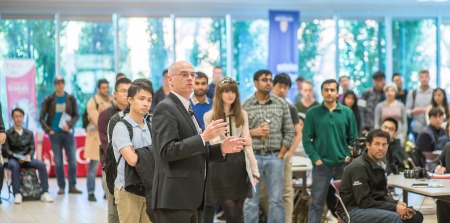
More than 200 engineering students and engineers attended Grad School Night at UAlberta's Faculty of Engineering Tuesday. Here, Dean of Engineering Fraser Forbes talks about the freedom and creativity graduate students enjoy.
(Edmonton) A group of more than 200 engineering students and alumni filled a forum Tuesday to learn how a graduate engineering education can lead to a more rewarding career.
The students and engineers met with representatives of Canada's Top 5 engineering schools, professors and graduate students, and industry representatives with advanced degrees.
Learn more about engineering graduate studies at the U of A
Some of the attendees had specific ideas about getting a graduate degree.
Danielle Schmidt, who's in the final year of the environmental engineering co-op program, said she's considering a master's degree in a different engineering discipline to match her broadening interests.
"The job I want requires a master's degree-I'm planning on switching fields," she said. Her studies in environmental engineering have focused to a large degree on water and decontamination, but Schmidt has become more interested in a career in renewable energy.
"I really like environmental engineering and I'm glad I have that in my knowledge base," she said. "But renewable energy is a bit outside my current area and a master's degree is a good way to reshape my path."
Schmidt has been researching master's programs online "for the past few months" but found the Graduate Studies Night event extremely useful. Representatives from engineering faculties at the Universities of Alberta, British Columbia, Waterloo, McGill and Toronto were on hand to meet with prospective grad students.
"This is a way to talk directly to people from five universities. You're getting really valuable information straight from the source."
Electrical engineering graduate Alex Janzen has earned his undergraduate degree in engineering physics and a master's degree in electrical engineering at the U of A. After completing a contract as a research associate on campus, he's now searching for employment and, given the economic situation, considering a PhD.
"I'm looking for the next thing-and that includes graduate studies," he said.
Being able to speak to representatives of five universities was valuable he said, adding that he still hasn't made up his mind.
"Right now it's hard for me to say how beneficial a PhD would be. It would open doors-especially in the nanotechnology industry-but I still need to talk to more people."
One working engineer who graduated with a degree in civil engineering from the U of A a few years ago said she's curious about graduate studies because the engineers in her workplace who have advanced degrees are the ones she's inspired by.
"They're the ones you go to when you have an odd problem that the usual solutions don't apply to, and they're really excited to see these things and to help with them," she said.
"I want to have a specialty that I can solve problems in."
One U of A engineering alumnus who is now a highly successful Silicon Valley venture capitalist told attendees that graduate degrees are becoming more and more valuable as technological change speeds up.
Rohit Sharma, who earned his master's degree in electrical engineering in 1991 and his PhD in 1996, says engineers with graduate degrees can "jump domains" because they have powerful tools to observe and analyze any challenge.
"Some of my colleagues are now three, four, five domains removed from their original fields," he said. "The ones who transitioned were the ones with graduate degrees in their pockets-you could see it-they were the flexible ones," he said.
"They say that in engineering you learn how to learn. What graduate school puts on top of that is that you learn how to think. Professors aren't going to tell you what to do-you're the one who is supposed to solve the problem."
Sharma made another very persuasive point about the value of a graduate degree: income potential.
When he graduated with his PhD in 1996, he said, his first job paid $65,000 per year. Within two months that rose to $85,000. Within a year that figure rose to $120,000 per year and after three years it had more than tripled, including stock he owned in high-tech firms.
"I don't think an undergraduate degree gets you onto that kind of a salary ladder," he said.
Earlier in the evening Dean of Engineering Fraser Forbes also addressed the issue, when he spoke to the students and graduates.
Forbes says the days when people with PhDs were considered overqualified for anything except a career in academia are long gone.
"In the 1980s I had to make a real hard decision about what doors it could close, but you today, you don't have to worry about that."
He added that completing a graduate degree has many benefits-not all of them financial.
"The businesses case on graduate studies doesn't always work, but on the happiness case? It works," he said, adding that graduate studies is a period in a person's life when they're free to explore issues and problems they want to explore.
"You get to pick the courses you take, you're most independent as a graduate student. All that anyone expects of you is that your work gets done. No one is checking to see if you are in at 7 a.m. or if you're still there at 11 p.m.," he said. "And you get work on stuff you love."